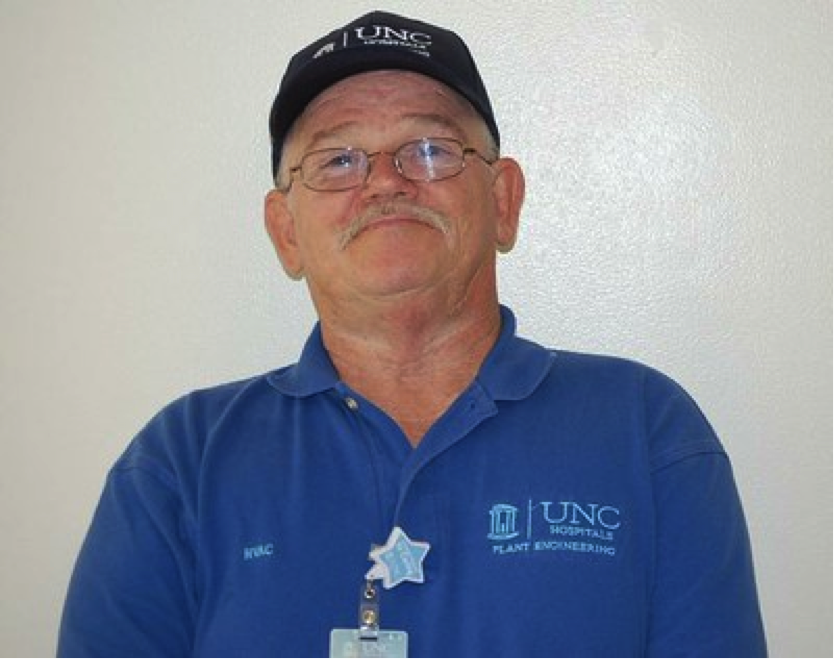Bob Pendergraph, an HVAC Mechanic who works in Plant Engineering, is a family man who enjoys spending time outdoors hiking, biking, and fishing. He realized that his smoking was preventing him from being active with his grandchildren. He also noticed that many people and places in his life were becoming smoke free and he did not want to inconvenience others with his smoking.
Although he was not pressured by his family to quit, he knew that quitting was the best thing for him and would help him to set a better example for his children and grandchildren.
“Why do I need these cigarettes?” Pendergraph asked himself. “They are just a crutch.”

Bob Pendergraph, an HVAC Mechanic who works in Plant Engineering, is a family man who enjoys spending time outdoors hiking, biking, and fishing. He realized that his smoking was preventing him from being active with his grandchildren. He also noticed that many people and places in his life were becoming smoke free and he did not want to inconvenience others with his smoking.
Although he was not pressured by his family to quit, he knew that quitting was the best thing for him and would help him to set a better example for his children and grandchildren.
“Why do I need these cigarettes?” Pendergraph asked himself. “They are just a crutch.”
As his desire to quit grew, Pendergraph began to reduce his smoking. Formerly a pack a day smoker, he was able to successfully cut down to ten cigarettes per day. However, he realized he could not completely quit on his own.
“I knew that fellowship with people who had the same struggle was going to be important for me when I was ready to quit,” said Pendergraph. He had heard about the Tobacco Free Tar Heels program from a friend and decided to check it out.
Tobacco Free Tar Heels is a free tobacco use treatment program for UNC Health Care employees and their families. Free medication and weekly support serve as significant incentives for employees, including Pendergraph, to sign on.
After enrolling in the program, participants receive an initial assessment with a tobacco treatment specialist and program manager for the Tobacco Free Tar Heels. During this appointment, the specialist works with participants to create a treatment plan, including tobacco cessation medication and regular follow-up. All medications are prescribed by Dr. Adam Goldstein, medical director of the UNC Nicotine Dependence Program.
“We come up with a tailored treatment plan for every participant,” said a former treatment specialist, “Each person has their own reasons for wanting to quit. A strategy that is perfect for one person might not work for another. We know that the combination of medication and counseling gives our employees the best chance of successfully quitting. Within this framework, we provide flexibility so that we can meet the needs of each individual.”
For Pendergraph, his treatment plan included the nicotine lozenge and weekly follow-up in a support group on Wednesday afternoons. The group provided an opportunity to talk about the challenges he was facing and offer encouragement to others.
The tobacco treatment specialist was a big influence in Pendergraph’s quitting journey. Initially, she challenged him to stop smoking a cigarette on the way home from work. Once Pendergraph accomplished this goal, he was then able to stop smoking a cigarette on the way to work as well, eliminating two cigarettes a day.
“From what I have seen in the program, there are many employees who are ready to quit but they need some additional assistance to be successful,” said the specialist.
After smoking for 50 years, Pendergraph’s last cigarette was on February 2, 2011. With the help of the Tobacco Free Tar Heels program, he is now able to fully enjoy outdoor activities with his family.
“I can actually take a walk down the beach without getting out of breath or go hiking and camping in the woods with the kids,” said Pendergraph.
He believes that better health is a great incentive for anyone to become tobacco free. “Every day you don’t smoke, your health is improving,” said Pendergraph.
Pendergraph is now active in telling his co-workers about what worked for him and encouraging them to seek help with quitting. Pendergraph advises smokers, “If at first you don’t succeed, quit again.”
If you or a family member who is covered by your State Health Plan are ready to make a quit plan, contact the program by calling (919) 445-5358 or emailing tobaccofreetarheels@unc.edu.